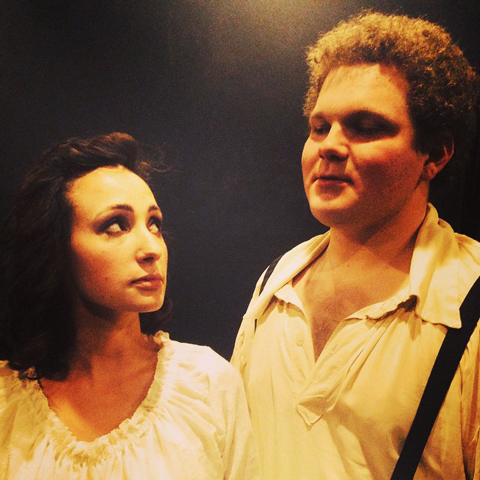
I IS ANOTHER Giorgi and Fisher. |
Gender confusion has probably been around for as long as gender conflicts. When Ugg was hopping around the cave fire showing how he brought down that mammoth, he was likely concerned that his voice not get too high-pitched.
What it means to be a man and be a woman is examined in many more themes and variations than biology would recognize in Jeffrey Hatcher’s Compleat Female Stage Beauty, which is getting a megawatt production by Epic Theatre Company (at Theatre 82 through September 20). Not only are there men dressed as women and women dressed as men, but at one point a man is dressed as a woman dressed as a man. It’s attentively directed by Jill D. Jones, who co-directed Angels in America at Epic last season.
As the title suggests, we get some historical perspective. The time is 1661 and the place is Merrie Olde England of the Restoration — under the reign of Charles II (Kyle DeMartino) — recently out from under the thumb of the merriment-quashing Puritans. Until the king changes the rules midway through the play, actresses are still banned from the stage, so female roles have to be performed by men.
That’s why we’re following the career of Edward “Ned” Kynaston (Jonathan Fisher), an historical figure whom Samuel Pepys called (in history, though not in the play) “the loveliest lady that ever I saw in my life.”
Fisher does a good job, especially in the second act when things get more serious, but since he’s not at all androgynous it’s a stretch for us to imagine him as the lovely Desdemona. That role is Kynaston’s specialty here, so convincing that overwhelmed audiences keep interrupting Othello after her death scene, to the annoyance of both him (“I haven’t finished the show in three fucking weeks”) and his Othello and theater owner, Thomas Betterton (Kevin Broccoli). Audience member King Charles, who was known as the “Merry Monarch,” is more concerned that the play be “jollier.”
Kynaston isn’t just convincing on the stage. After one performance he is taken nearby to a sketchy park by two wealthy women curious to see, literally, which gender he is; Lady Meresvale (Cherylee Sousa Dumas) and Miss Frayne (Stephanie Traversa) are a recurring reminder of how important aristocratic patrons were. In the park, a drunken Sir Charles Sedley (Christine Pavao) comes by and tries to solicit Kynaston as a prostitute. Insults follow, as well as enduring anger by Sedley, which complicates the actor’s life later on.
Kynaston’s professional rival at a competing theater is Margaret Hughes (Kerry Giorgi), a Desdemona who has the advantage of actually being a woman. The actor is unimpressed with the notion of a female playing the part: “A woman playing a woman. What’s the trick in that?” Later on Kynaston coaches her about relying on normal human behavior rather than exaggerated gestures in the Othello murder scene, a fascinating discussion. The exposition is so convincing that we wonder why naturalistic acting didn’t catch on earlier in stage history.